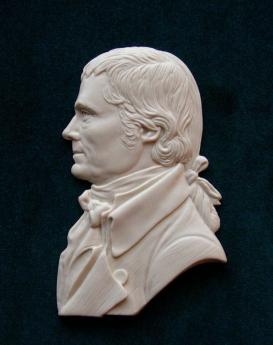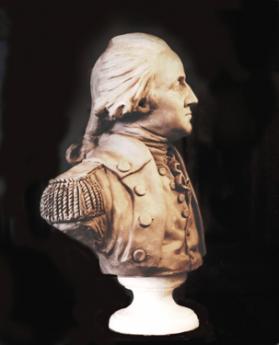Related Topics
..Constitution and Court
Forget all those lawyer jokes you hear. The American legal profession can rightly be proud of the Federal Court System, an achievement of the whole profession. America may be legalistic and overlawyered, but that reflects the rule of law dominated by lawyers. Curiously, the leader of this creation, John Marshall, was not so much a legal theoretician as a relentless Federalist lawyer, determined to reshape the legal profession to be worthy of power.
Leadership and Priesthood
The Divine Right of Kings is not of much use anymore, even to kings. Nevertheless, it reflects a need to define the final authority, the final word, and therefore creeps into the legal system in various ways, even within a pure democracy. Aside from these traces in the most fundamental of laws, a democracy defines the ultimate leader by the slogan, "The Buck stops here." Late at night, pondering his decisions alone, the highest ruler of the State is apt to feel that all his responsibilities are burdens without compensating divine rights. That's not entirely true. He may use his discretion to bend or break the law in the public interest. But if it fails, he may never get a second chance.

|
| John Marshall |
Start with the example of Euclidian Geometry, where each step is a tightly proven consequence of other steps until you get 'way back to basic fundamentals, called axioms. Axioms are assumptions which have to be made without any proof. The axioms are probably true, but they have to be taken on faith, with the frank acknowledgment that if the axioms are changed, everything dependent on them must also change. The ancient philosophers mostly fell back on God to be the source of axioms, but in modern times it is more customary to rely on "Nature" as the source. During the Eighteenth century Enlightenment period, the "deists" fell back on "Nature's Creator" as a way of saying God without exactly saying it. The deists thus were able to say they believed in God, but only to the extent that He wound up the clock which now runs by itself. If you frankly haven't any idea where these axioms came from, you attribute them to one or the other of these concepts and go on with practical business. Just to take no chances on leaving a gap, a populace which universally believed in God was told that the King was the sole confidante, the sole agent, of God. As things evolved, the King had a divine right which extended to political matters, and the Priesthood was the local authority about matters of morals and spiritual consequence. As priesthood declined in popularity among protestants, Judges assumed the role of deciding "difficult questions", sometimes delegating the role to juries. Kings when they are little princes often get the idea that they are entitled to be capricious, otherwise what good is it to be King? This attitude is sometimes not discouraged when it relates to castles and fancy cars, maybe even to girlfriends. But if it is carried too far there is a danger that arbitrary capricious decisions may seem like a habit, carried over to issues the population has reserved to decide in other ways. When the king does it anyway, he is called an absolute monarch, not always a term of praise, and sometimes the first stage of incipient revolt. Nevertheless, there are inescapably some decisions which must be made, right or wrong, and somebody must make them and take the consequences.

|
| George Washington |
When American Independence was declared, but much more when the Constitution was ratified, it was the first time the former colonists were confronted with living in a system where every citizen was considered equal and sovereign, and nobody else was a contender. A representative Republic provided the practical means for collective expression, and for forty or fifty years the public nursed their fantasy of Every Man a King. Politicians were however soon nibbling at the margins, and the practicalities of running the country did require certain practical concessions. The unexpected growth of the population, from one representative for 30,000 inhabitants to the present 600,000 inhabitants confronted America with a choice it never seemed to accept: a Congressman with 600,000 constituents can never remain in touch with their wishes. But a Congress with 6000 debaters cannot function, either. We have outgrown the original model, but have been unable to devise a satisfactory modification. The sovereignty of the people under such circumstances is much more limited, and the need for arbitrary decisions by the elected monarchs increases. All that remains of control rests in the periodic elections. And the realities of those elections are grim. Political parties dominate the nomination step. Gerrymandering concentrates domination of proportional representation into "safe seats" which permit party control of a majority of the representatives. Incumbency, instead of simply augmenting experience, leads to the electoral power of "name recognition" which all too often is recognition of the name of some relative of the actual candidate. The cost of campaigning among such large population groups greatly magnifies its concentration in parties or interest groups. And the social distance between voter and candidate reaches the point where voters are more easily deceived, by a mountebank. The talent of getting elected has decreasing relation to the talent of governing. Something will be done about these problems, but not necessarily very soon, or very adequately.
So we are reverting back toward sovereignty remote from the people, slowly and only partially we hope. Some of the features of remote sovereignty persist for that reason. We are forced to concede the decisions about atom bombs to the President, about the assassination of terrorists to the security agencies, the currency to the Chairman of the Federal Reserve, and the containment of epidemics to the CDC in Georgia. We delegate such authority to hierarchy in millions of daily ways. A guard was asked whether he would shoot a fellow citizen who was protesting something. His grim answer was, "I will shoot anyone the Sergeant tells me to shoot." It isn't a completely satisfying situation, but it is a variation of what John Marshall called "due process of law". We attempt to limit local discretion by organizing rules for every contingency which would require individual discretion, thus minimizing the chance of a capricious decision. The paradox is that most of this rule by regulation was promoted by the political party of Thomas Jefferson, who was our first experiment in making an instinctive anarchist into our leader. The responsibilities of office made Jefferson retreat in many ways, but it was his cousin John Marshall who knew him intimately and applied the brakes. Marshall, Ellsworth, and Story shared a vision of what the legal system could be, helped ease it into that posture, and then laid out a system of behavior which was at its root, "Honesty is the best policy", the theme of George Washington's Second Inaugural address. Marshall was an absolute ruler of the legal profession and was not above bending its rules to his design. He thought he knew what the Constitution was meant to be, and was determined to make the Judiciary enforce it. What was most distinctive was his insinuation of those principles into daily life, the culture of the nation. After the last vestige of the Federalist political party had disappeared, he intentionally made the American culture a Federalist culture, while seemingly confining his writ to the Federal Judiciary.
Originally published: Wednesday, August 15, 2012; most-recently modified: Thursday, May 23, 2019